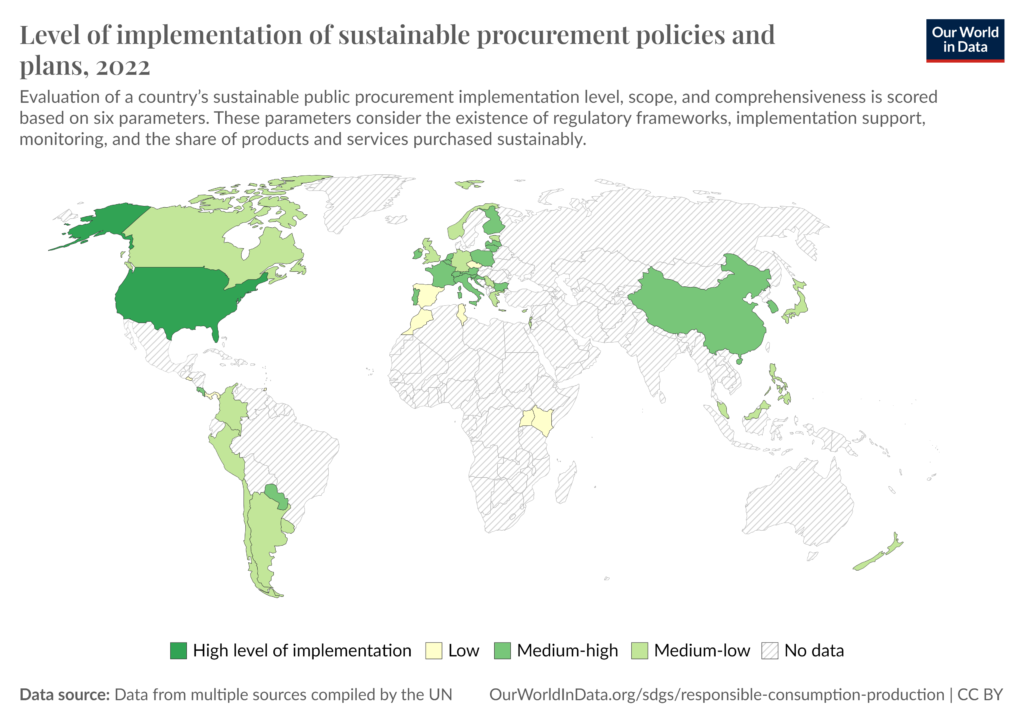Sustainable procurement, also known as green procurement or ethical sourcing, refers to the process of integrating environmental, social, and governance (ESG) factors into procurement decisions. This approach aims to balance sustainability with profitability and meeting stakeholder requirements. It allows purchasers to correctly identify and reduce environmental risks within a supply chain. Sustainable procurement offers a number of benefits such as: lower carbon emissions, reduced waste, and less pollution; long-term savings through energy-efficient products, reduced waste, and lower disposal costs; enhanced public perception and brand value by demonstrating a commitment to sustainability; reduced risks related to supply chain disruptions, compliance issues, and ethical breaches; and finally, it encourages the development of new, sustainable products and services.

Key Factors Driving Sustainable Procurement Adoption
External Factors
- Legislation and regulation: Stricter regulations related to environmental protection, labor rights, and corporate social responsibility (CSR) are being implemented by governments worldwide. This trend creates a legal imperative for businesses to adopt sustainable practices.
- Industry competition and stakeholder pressure: Consumers, investors, and other stakeholders are increasingly demanding that companies demonstrate a commitment to sustainability. This pressure can influence procurement decisions as companies attempt to maintain a positive reputation.
- Global trends: Climate change, resource scarcity, and social inequality are becoming more pressing issues for many organizations. Sustainable procurement can help to address these challenges and contribute to a more sustainable future.
Internal Factors
- Corporate social responsibility: Many companies are recognizing the importance of CSR and are integrating sustainability into their core values. Sustainable procurement aligns with this commitment.
- Cost savings: Optimizing resource use, reducing waste, and improving supply chain efficiency, sustainable procurement can lead to significant cost savings.
- Risk management. Sustainable procurement helps mitigate risks associated with supply chain disruptions, reputational damage, and regulatory noncompliance.
- Innovation: By partnering with suppliers who are committed to innovation, companies can gain access to new technologies and products that can enhance their sustainability performance.
Why Adopt Sustainable Procurement
Adopting a sustainable procurement strategy can benefit a company in a number of ways. By recycling, investing in energy-efficient technology, and using sustainable suppliers, companies are able to reduce costs. According to the World Economic Forum (WEF), sustainable procurement can reduce procurement costs by 9-16%. Sustainable procurement can help companies understand where their raw materials come from, and how they are sourced and processed. In addition, they can reduce carbon emissions and make their processes have a lower impact on the environment. As consumers are placing greater value on sustainability, adopting a sustainable procurement strategy can improve a company’s brand image, leading to more customers and revenue.
Developing a Sustainable Procurement Plan
Implementing a sustainability procurement plan can significantly impact your organization’s environmental and social footprint. Here are some best practices to guide your adoption:
- Define objectives and goals: It is important that sustainability goals align with overall corporate strategy. The plan requires clear, measurable goals in order to track progress and accountability.
- Conduct a supply chain assessment: Identify the hotspots where your supply chain has the greatest environmental or social impact.
- Assess supplier performance: Evaluate your suppliers’ sustainability practices and identify areas for improvement.
- Develop a robust sustainability policy: Clearly communicate sustainability requirements to suppliers covering environmental protection, social responsibility, and ethical sourcing.
- Implement supplier evaluation and selection criteria: Include ESG factors in your supplier evaluation process. Consider utilizing third-party sustainability ratings to assess supplier performance.
- Monitor and measure performance: Establish key performance indicators (KPIs) to measure progress against sustainability goals. Be sure to regularly assess supplier performance and identify areas for improvement.
- Report on sustainability progress: Share your sustainability achievements and progress with stakeholders.
- Continuously improve: Analyze sustainability performance and identify areas for improvement. Stay updated on industry trends and emerging sustainability challenges.
Some additional steps a company can take include:
- Involve stakeholders: Engage employees, suppliers, and other stakeholders in the development and implementation of your sustainability procurement plan.
- Consider certifications: Encourage suppliers to obtain relevant certifications, such as ISO 14001 or Fair Trade.
- Leverage technology: Utilize technology to streamline sustainability reporting, supplier evaluation, and performance tracking.
By following these best practices, you can effectively adopt a sustainability procurement plan that drives positive environmental and social impact while enhancing your organization’s reputation and competitiveness.
Sustainable Procurement Case Studies
Unilever, a leader in the consumer goods industry, has implemented its Sustainable Living Plan with the goal of sourcing 100% of its agricultural raw materials sustainably. This initiative focuses on improving agricultural practices, reducing environmental impacts, and ensuring fair labor conditions by working closely with farmers. A standout achievement is Unilever’s sustainable sourcing of palm oil, where the company has committed to obtaining all palm oil from certified sustainable sources. Through partnerships with the Roundtable on Sustainable Palm Oil (RSPO) and investments in traceability, Unilever has made significant strides in reducing deforestation and enhancing livelihoods in palm oil-producing regions. As of the latest reports, Unilever has achieved over 60% sustainable sourcing of its key agricultural raw materials. In addition, the company implemented a Responsible Partner Policy that provides all partners with the fundamental principles and requirements they must follow to work with them.
Patagonia, a prominent outdoor apparel company, is known for its deep commitment to environmental sustainability, which is reflected in its sourcing practices. The company prioritizes organic and regenerative agriculture, fair trade certifications, and the use of recycled materials. A prime example of Patagonia’s dedication to sustainable sourcing is its approach to wool sourcing. Patagonia sources wool from farms that practice regenerative agriculture, helping to restore soil health, increase biodiversity, and sequester carbon. These sustainable sourcing practices have set industry standards for responsible material sourcing and have significantly contributed to Patagonia’s overall sustainability goals.


